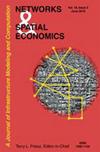WTO Accession Factors and Algeria’s Potential: A Comparative Study with Russia and Saudi
IF 1.5
3区 工程技术
Q3 OPERATIONS RESEARCH & MANAGEMENT SCIENCE
引用次数: 0
Abstract
This paper aims to assess the factors affecting the accession to the WTO and hence evaluate Algeria’s potential to complete its accession. Literature identifies 4 principal factors that can affect the process: economical, political, commercial and institutional. Thus, a comparative and empirical study has been done based on a weighted score method, this method put all factors in the same scale from 0 to 10 points for the three countries: Algeria, Russia and Saudi Arabia. Results show that Algeria has have an acceptable rating compared to the two other countries in institutional factor, as they have average governance scores, and political, as none of the three countries is aligned with WTO major. While it is much lower than Russia in economic framework, even if Saudi Arabia is at same level, this is mainly due to lack of diversification and subsidies, especially fuel prices. In the commercial factor Algeria is far from the other two countries as it lacks many adjustments in this sector, mainly in applied tariffs, FDI, exports and PTAs. Negotiation duration is also holding back the accession process, this can become even more difficult as it extend more. In the other hand, oil prices fluctuations can enhance institutional factors while new regional trade agreement can constitute a more interesting alternative to WTO accession加入WTO因素与阿尔及利亚潜力:与俄罗斯、沙特的比较研究
本文旨在评估影响加入世贸组织的因素,从而评估阿尔及利亚完成其加入的潜力。文献确定了影响这一进程的4个主要因素:经济、政治、商业和制度。因此,本文采用加权分数法对阿尔及利亚、俄罗斯和沙特阿拉伯这三个国家进行了比较和实证研究,该方法将所有因素都放在相同的范围内,从0到10分。结果显示,与其他两个国家相比,阿尔及利亚在制度因素和政治方面的评级都是可以接受的,因为这两个国家的治理得分平均,而这三个国家都没有与WTO主要国家保持一致。虽然在经济框架上远低于俄罗斯,但即使沙特处于同一水平,这主要是由于缺乏多样化和补贴,特别是燃料价格。在商业因素方面,阿尔及利亚与其他两个国家相距甚远,因为它在这一部门缺乏许多调整,主要是在实施关税、外国直接投资、出口和自由贸易协定方面。谈判时间也阻碍了加入进程,随着时间的延长,这可能会变得更加困难。另一方面,石油价格波动可以加强体制因素,而新的区域贸易协定可以成为加入世贸组织之外更有趣的选择
本文章由计算机程序翻译,如有差异,请以英文原文为准。
求助全文
约1分钟内获得全文
求助全文
来源期刊

Networks & Spatial Economics
社会科学-运筹学与管理科学
CiteScore
4.00
自引率
4.20%
发文量
26
审稿时长
>12 weeks
期刊介绍:
Networks and Spatial Economics (NETS) is devoted to the mathematical and numerical study of economic activities facilitated by human infrastructure, broadly defined to include technologies pertinent to information, telecommunications, the Internet, transportation, energy storage and transmission, and water resources. Because the spatial organization of infrastructure most generally takes the form of networks, the journal encourages submissions that employ a network perspective. However, non-network continuum models are also recognized as an important tradition that has provided great insight into spatial economic phenomena; consequently, the journal welcomes with equal enthusiasm submissions based on continuum models.
The journal welcomes the full spectrum of high quality work in networks and spatial economics including theoretical studies, case studies and algorithmic investigations, as well as manuscripts that combine these aspects. Although not devoted exclusively to theoretical studies, the journal is "theory-friendly". That is, well thought out theoretical analyses of important network and spatial economic problems will be considered without bias even if they do not include case studies or numerical examples.
 求助内容:
求助内容: 应助结果提醒方式:
应助结果提醒方式:


